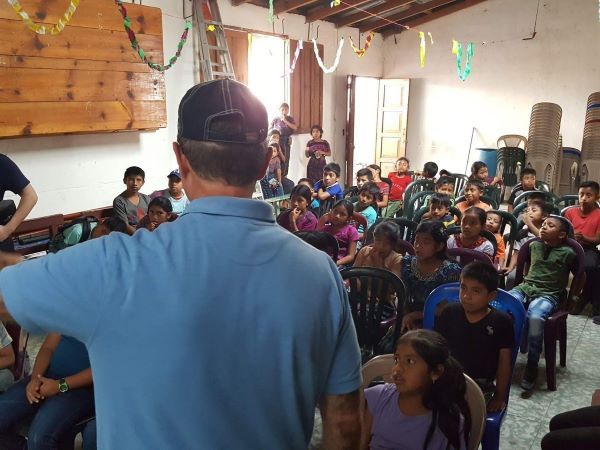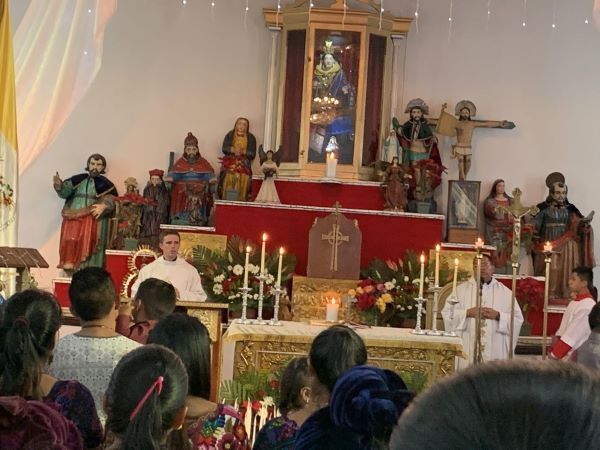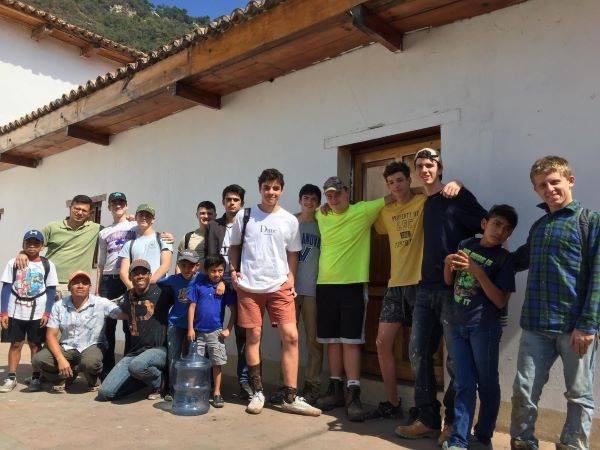We spent almost all of our time in the small indigenous village of Santa Caterina Palopo. The town has a population of about 7,000, virtually all of whom live a simple and meagre life, especially compared to American standards. At the same time, the residents live joyful lives – focused on their family, their honest work, their faith. In many respects, their life is more human than that of many people here in the States.
After spending the first night at a student residence in Guatemala City, we drove to Santa Caterina Palopo, where we would be living and working. We arrived at around 10 am, unpacked, and walked into town. Since this annual service project has been going on for two decades, the children by now know that “los americanos” will be arriving around this time of year and look forward to our return. The trip could not take place last year, which meant they were all the more excited this time around. Waving at us and laughing, they trickled into the parish hall to meet us.

We were shown around the Church property by Lucas, the father of two daughters, who has lived in Santa Caterina Palopo all his life and who would be our chief guide throughout our work project. First, there was the parish hall’s kitchen, with smoke-blackened walls, sinks that didn’t drain well (if at all), and a general sense of disorder. Our plan involved painting the walls and ceiling, giving a deep cleaning and new paint job to the parish sacristy, and finally refurbishing the priest’s residence. The latter was the most important task, since the town has not had a priest in residence for many years. The hope is that these renovations will help put the church in a condition to receive a permanent pastor, and in fact this may happen soon. Lucas’ excitement was evident in his eagerness to help us.
Our work involved fixing water closets in disrepair, scrubbing grimy floors, ridding crooks and crannies of thick spider webs, cleaning dirty furniture…. Many of the jobs were unpleasant humanly speaking, but at the same time it was joyful and fun – that ever present Christian paradox found in serving others.
Our days in Santa Caterina Palopo took on the rhythm of the renovation projects in the mornings and assisting the children of Santa Caterina in the afternoons. We provided simple classes and then played even simpler games, with a visit to the Blessed Sacrament at the parish in between.
Most of us did not speak Spanish, which made teaching English and catechism classes a challenge. Leveraging the Spanish speakers among us and speaking the universal language of smiles and laughter, we were able to teach a surprising amount.
We entered the children’s world and became their older siblings or uncles for the week. They gave one of us the nickname “Tio Billy,” which we even adopted ourselves. The children would grab hold of Tio Billy and try to bring him down. When he later fell sick one day with a small illness, we were pretty sure he had contracted from the little ones. When he recovered and we teased him a bit about it, he said if he got it from the children then it was well worth it.

One of the most memorable parts of the trip was being able to attend Mass along with the other townspeople. Fr. Joe, the chaplain of the trip, concelebrated with the priest who makes regular trips to the town, and who speaks the native language Kaqchikel. The Mass was partly in Spanish and partly in Kaqchikel, so that most of us were completely lost as to what was being said. But we were able to follow the parts of the Mass, which are the same everywhere. Many of children we had come to know were there with their families and were happy to see us.

In the afternoons, we went to visit the homes of families in Santa Caterina Palopo. I don’t want to give the impression that the people of Santa Caterina Palopo live in some sort of pre-technological paradise, untouched by the troubles of the developed world. The poverty is dramatic, and hard to imagine unless you have seen it for yourself. Most of the houses were built with cinder blocks and plastic tarps for roofs. But the people seemed joyful and strong, finding support in their family and faith.

Talking with the boys during and after the trip, it was evident how big of an impact these home visits had on them. When I asked one of the fellows what he hoped to take away from the trip, he said he wanted to learn to be more thankful for what he had, because he had never realized how much he had until he saw families with so little. It was a sentiment which I am sure all of us were feeling afterwards. Against this backdrop of true poverty, the joy of everyone we met, from our foreman Lucas to the laughing children, left a deep impression on us.
On our final day there, Lucas gave us some gifts and parting words. It was humbling to see how much he appreciated our service. And it was a joyful moment to reflect on how we were serving real, living people, many of whom we had come to know quite well over the past week.

Our final activity was a hike up the nearby Pacaya volcano. It was an overcast day, which restricted the visibility a bit, but we all enjoyed it. At the top, smoke was rising from the volcano rocks, and we used the heat to roast some delicious marshmallows.
The final talk of the trip took place on top of Pacaya. The person giving it called to mind all the people we had met, the friends we had made. He pointed to the hidden lava flowing inside Pacaya, which gives off heat, and said that this is how our own lives should be – having a strong manly fire within, without show or notice, which gives off the warmth of generous service to those around us.
